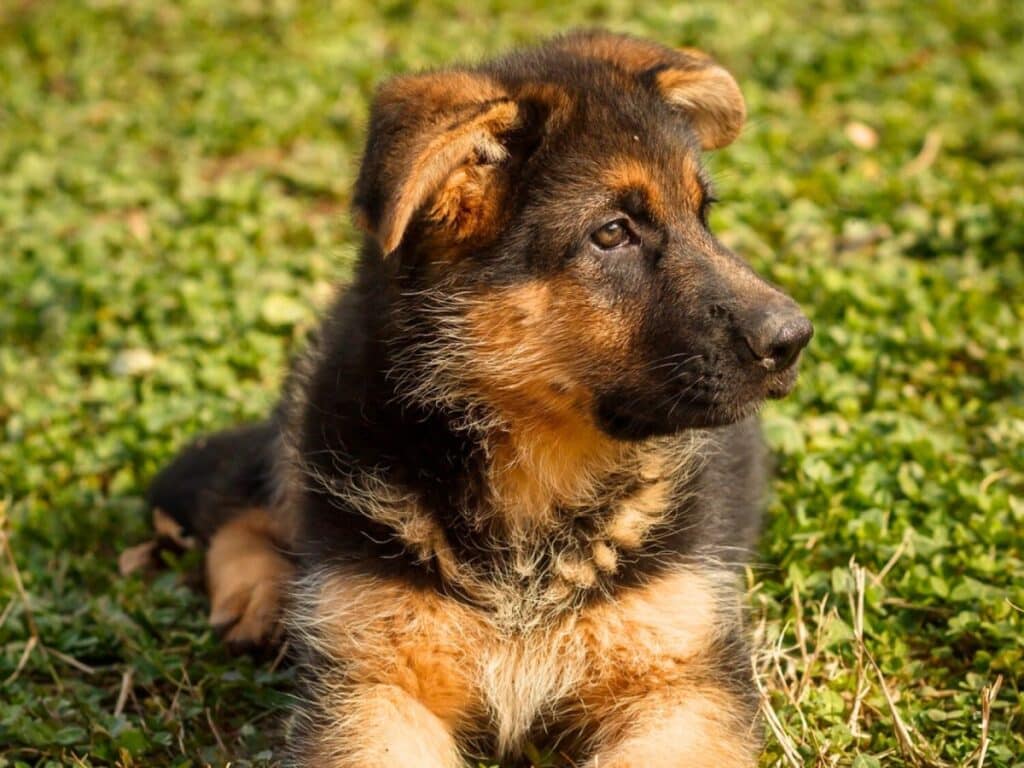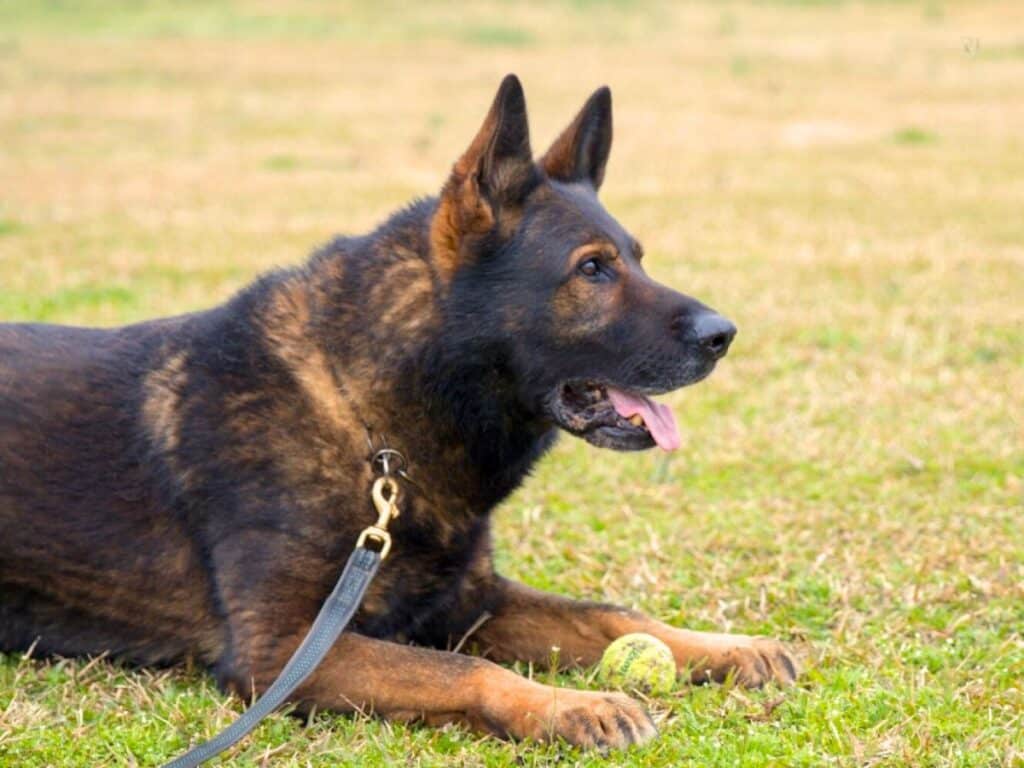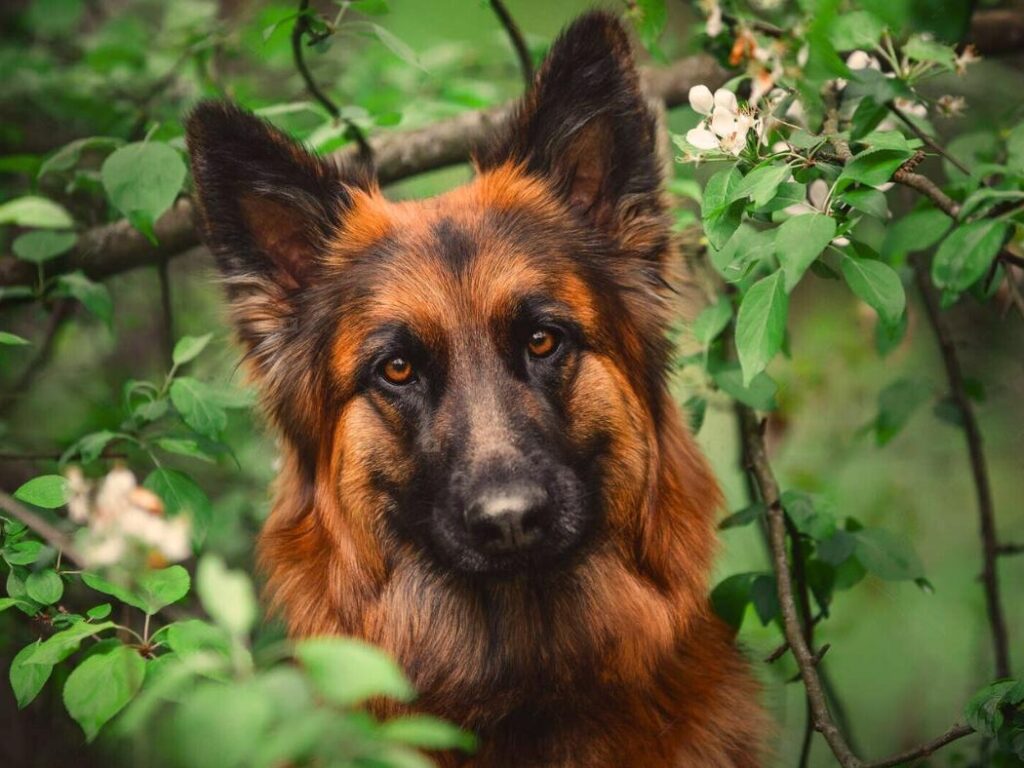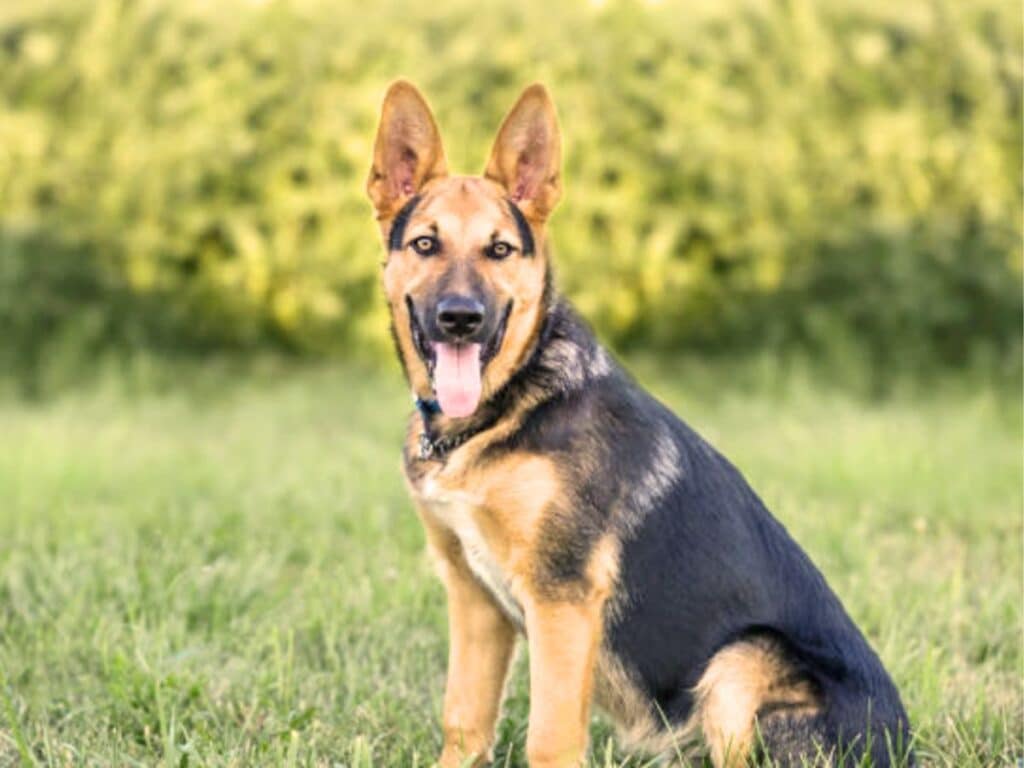You may be considering bringing home a 10-week-old German Shepherd puppy, or maybe you already have one. In either case, you must know that puppies this young need special care and attention when it comes to their nutrition, care, and training.
So in this post, I’ll give you some useful tips on raising your puppy, covering everything from training and vaccination to feeding and socialization.
10 Week Old German Shepherd Puppy
At around 10 weeks, German Shepherd puppies typically exhibit a mix of curiosity, bursts of high energy, and a penchant for exploration.
In the table below, I have outlined various aspects of their development, covering details such as size, weight, coat characteristics, behavior, training progress, and health considerations.
| Height | 8-11 inches |
| Weight | Approximately 12-20 pounds |
| Ears | May still be floppy, starting to stand occasionally |
| Eyes | Dark brown, almond-shaped |
| Teeth | Puppy teeth present, teething may be occurring |
| Diet | 3-4 meals a day, primarily puppy food |
| Activity Level | Energetic, playful, bursts of high activity followed by naps |
| Training | Basic commands like sit, stay, and leash training. Beginning socialization. |
| Sleep | 14-18 hours per day, with short periods of wakefulness for play and meals |
| Vaccinations | First round of vaccinations should be completed |
| Health Check | Regular veterinary check-ups for vaccinations and overall health |
| Socialization | Exposure to various environments, people, and other animals |
| Behavioral Development | Curious, may start showing signs of independence, beginning to explore surroundings |
Remember that individual puppies may vary, and these details are generalizations. Regular veterinary care, proper nutrition, and positive training will contribute to a healthy and well-behaved German Shepherd puppy.
Average Weight of a 10 Week Old German Shepherd
On average, a 10-week-old male German Shepherd puppy typically weighs between 15 to 22 pounds, while a female German Shepherd puppy may weigh between 12 to 20 pounds.
It’s important to note that factors such as genetics, diet, and overall health can influence a puppy’s weight at this stage of development.
How Big is a 10 Week Old German Shepherd
On average, a 10-week-old German Shepherd may stand around 8 to 11 inches tall at the shoulder. The length from the tip of the nose to the base of the tail could be approximately 12 to 18 inches.
Please keep in mind that these are general estimates, and individual puppies may be smaller or larger than the averages. German Shepherds are known for their rapid growth during the puppy stage, and their size can change significantly in just a few weeks.
Check out my article German Shepherd Growth Chart to learn more about the growth and development of your puppy as he/she matures.

What Does a 10 Week Old German Shepherd Look Like?
At 10 weeks old, a German Shepherd puppy is adorable and may exhibit certain characteristic features typical of the breed.
- Coat: At 10 weeks, their fur is typically short, dense, and soft.
- Ears: Some puppies have fully erect ears by this age, while others may still have floppy ears that are in the transition phase.
- Eyes: Dark brown eyes with an almond shape are characteristic of German Shepherds. The eyes may appear bright and expressive.
- Teeth: At 10 weeks, the puppy is likely teething, and you may observe the presence of sharp puppy teeth. This is the stage when they start losing their baby teeth, making way for adult teeth.
- Legs: The legs are likely to be sturdy and well-boned, providing a foundation for the puppy’s future growth. The paws may seem relatively large compared to the rest of the body at this stage.
- Body: The body is still in the process of lengthening and gaining muscle mass.The overall build may be somewhat compact, with a noticeable chest and a gradually tapering abdomen.
- Posture: The puppy’s posture is likely to be a bit uncoordinated as it learns to balance and move around confidently. Some puppies may have a slightly roly-poly appearance as they grow into their bodies.
Remember that individual variations exist, and the appearance of a German Shepherd puppy can be influenced by factors such as genetics, diet, and overall health.

Dietary Guidelines for Optimum Growth
How Much Should a 10 Week Old German Shepherd Eat?
A 10 week old German Shepherd puppy should eat 1.5 – 2 cups of puppy food mush spread over 4-5 meals per day.
The amount of food a puppy should eat can also vary based on factors such as the specific food brand, the puppy’s weight, activity level, and individual metabolism.
The portion size will depend on the specific puppy food you’re using. Follow the feeding guidelines on the food packaging, which typically provide recommendations based on the puppy’s weight.
German Shepherd puppies have high energy requirements, so it’s essential to feed them a high-quality puppy food that is formulated to meet the nutritional needs of large breed puppies.
The food should contain essential nutrients such as protein, fat, carbohydrates, vitamins, and minerals to support overall health. Consider choosing puppy food that includes DHA (docosahexaenoic acid), which is important for brain and vision development in puppies.
Keep an eye on your puppy’s weight and body condition. If your puppy is gaining weight too quickly or seems overweight, you may need to adjust the portion sizes or choose a lower-calorie puppy food.
Avoid Table Scraps and Human Food
While it can be tempting to share your meals with your puppy, it’s important to avoid giving them table scraps and human food. Stick to a nutritionally balanced puppy diet to ensure they get the right nutrients in the correct proportions.
Always make sure your puppy has access to fresh water. Proper hydration is essential for their overall health.
RELATED: How Much To Feed a German Shepherd Puppy

What to Expect From a 10 Week Old German Shepherd
At 10 weeks old, a German Shepherd puppy is in the early stages of development and will exhibit typical puppy behaviors. Here are some common behaviors you can expect from your pup:
- Playfulness: Puppies, including German Shepherds, are generally very playful. They have lots of energy and love to explore their environment.
- Bite Inhibition: At this age, puppies are still learning bite inhibition, which is the control of the force of their biting. Provide appropriate chew toys to help with teething, and use positive reinforcement to encourage gentler behavior.
- Curiosity: German Shepherd puppies are known for their intelligence and curiosity. They’ll want to investigate their surroundings, sniff everything, and engage in exploration.
- Biting and chewing: Puppies explore the world with their mouths, and you may notice a lot of biting and chewing behavior.
- Attention-Seeking Behavior: Puppies crave attention and affection. Provide positive attention for good behavior, and discourage unwanted behaviors by redirecting their focus.
- Sleeping: Puppies need a lot of sleep for proper growth and development. Your German Shepherd puppy may sleep for 15-20 hours a day, both during the day and at night.
- Teething: Your puppy will likely be teething, which means they may chew on various objects to relieve discomfort. Provide appropriate chew toys and avoid leaving valuable items within their reach.
- Vocalization: Puppies may bark, whine, or make other vocalizations to communicate their needs. Pay attention to their cues to understand when they need to go outside, play, or rest.
If you have specific concerns or questions about your puppy’s behavior, consider consulting with a professional dog trainer or your veterinarian for guidance.
RELATED: German Shepherd Behavior Stages By Age

Training a 10 Week Old German Shepherd Puppy
Training a puppy involves focusing on basic commands, socialization, and establishing a positive relationship between you and your puppy.
Here are some tips to help you train your pup:
Start with Basic Commands
- Sit: Use treats and positive reinforcement to encourage your puppy to sit. Hold a treat above their head, and as they naturally sit down, say “sit” and reward them.
- Stay: Begin with short distances. Ask your puppy to stay, take a step back, then return and reward them if they stay in place.
- Come: Say the word “come” in a clear and upbeat tone. Use a happy and inviting voice to encourage your puppy.
RELATED: 30 German Shepherd Training Commands & Free PDF
Socialization
- Introduce your puppy to various environments, people, and other animals. Positive early experiences will help them become well-adjusted adults.
- Allow controlled interactions with friendly and vaccinated dogs to promote positive social behavior.
RELATED: How To Socialize Your German Shepherd: Checklist Included
House Training
- Establish a routine for potty breaks, especially after eating, waking up, or playing.
- Praise and reward your puppy when they go to the bathroom outside, reinforcing the desired behavior.
RELATED: How To Potty Train a German Shepherd Puppy Easily

Crate Training
- Introduce your puppy to their crate as a safe and comfortable space.
- Use treats and positive reinforcement to encourage them to enter the crate willingly.
RELATED: How to Crate Train a German Shepherd Puppy?
Handling and Grooming
- Get your puppy used to being handled, including touching their paws, ears, and mouth.
- Introduce grooming tools gradually to make future grooming sessions easier.
Leash Training
- Use a lightweight leash and collar. Let your puppy get used to wearing them indoors before venturing outside.
- Begin with short, positive leash experiences, rewarding your puppy for walking beside you.
RELATED: How To Leash Train a German Shepherd Puppy
Positive Reinforcement
- Use treats, praise, and positive reinforcement to reward good behavior. German Shepherds are often motivated by food, so find high-value treats.
- Avoid punishment-based training, as positive reinforcement builds trust and a stronger bond.
Short Training Sessions
- Keep training sessions short and enjoyable, around 5-10 minutes multiple times a day. Puppies have short attention spans.
Consistency is Key
- Be consistent with commands and rules. Use the same cues and rewards to avoid confusion.
- Involve all family members in training to ensure consistency.
Remember that every puppy is unique, and progress may vary. If you encounter challenges or have specific concerns, consider seeking guidance from a professional dog trainer or consulting with your veterinarian for personalized advice.
Check out this video of a 10 week old German Shepherd puppy undergoing training…
How To Take Care of Your Puppy
Caring for a puppy involves providing a loving and nurturing environment, attending to their basic needs, and establishing a foundation for a healthy and well-behaved adult dog. Here are some essential puppy care tips:
Veterinary Care
- Schedule regular veterinary check-ups to monitor your puppy’s health, vaccinations, and preventive care.
- Discuss a vaccination schedule, parasite prevention, and any specific health concerns with your veterinarian.
RELATED: German Shepherd Vaccination Schedule: PDF Chart Included
Nutrition
- Feed your puppy a balanced and age-appropriate diet. Choose high-quality puppy food to support their growth and development.
- Follow the feeding guidelines provided on the dog food packaging and adjust based on your puppy’s weight and activity level.
- Provide fresh water at all times.
Potty Training
- Establish a consistent potty training routine. Take your puppy outside frequently, especially after meals, playtime, and waking up.
- Use positive reinforcement and praise when your puppy goes to the bathroom in the designated outdoor area.
- Be patient and avoid punishment for accidents, as puppies are still learning.
Crate Training
- Introduce your puppy to crate training early on. A crate can serve as a safe and comfortable space for your puppy when you’re not around.
- Gradually increase the amount of time your puppy spends in the crate and make it a positive experience with treats and toys.
Socialization
- Expose your puppy to various people, environments, and other animals to promote socialization.
- Attend puppy socialization classes to help your puppy build confidence and learn appropriate behaviors.

Chew Toy Provision
- Puppies naturally chew to alleviate teething discomfort and explore their world. Provide a variety of appropriate chew toys to satisfy this instinct.
- Rotate toys to keep them interesting and prevent boredom.
Basic Training
- Start basic training early, teaching commands such as “sit,” “stay,” and “come.” Use positive reinforcement techniques, such as treats and praise.
- Keep training sessions short, fun, and age-appropriate. Gradually increase the difficulty as your puppy learns.
Grooming
- Brush your puppy’s coat regularly to prevent matting and reduce shedding.
- Introduce your puppy to grooming routines, such as nail trimming and ear cleaning, to make these activities more comfortable as they grow.
Exercise and Play
- Provide age-appropriate exercise and playtime. Puppies have lots of energy and benefit from both physical and mental stimulation.
- Supervise play to ensure your puppy’s safety and teach them appropriate play behaviors.
Affection and Bonding
- Spend quality time with your puppy, building a strong bond through play, cuddling, and positive interactions.
- Be patient and understanding as your puppy learns and grows, reinforcing positive behaviors with love and attention.
Remember that raising a puppy requires time, patience, and commitment. Consistent training, positive reinforcement, and a loving environment will contribute to a well-adjusted and happy adult dog.

How to Teach a 10 Week Old German Shepherd Bite Inhibition?
Puppies explore the world with their mouths, and it’s natural for them to bite during play. However, it’s important to redirect this behavior and teach bite inhibition.
Here are some tips:
- Redirect with Toys
- When your puppy starts to bite you, immediately redirect their attention to an appropriate chew toy. This helps them understand what is acceptable to chew on.
- Use a Firm “No” or “Ouch”
- When your puppy bites too hard, let out a high-pitched “ouch” or say “no” in a firm but not overly loud voice. This mimics the way littermates would react if bitten too hard during play.
- Withdraw Attention
- If your puppy continues to bite despite the redirection and vocal cues, withdraw your attention. Stand up, turn away, and ignore them for a short period. Puppies quickly learn that biting leads to a loss of attention.
- Time-Outs
- If the biting persists, you can implement short time-outs. Move away from your puppy and give them a brief break. This reinforces the idea that biting results in a loss of playtime.
Remember that patience and consistency are key when teaching bite inhibition. It takes time for puppies to learn appropriate play behaviors, so be persistent in reinforcing positive habits.
RELATED: How To Stop German Shepherd Puppy From Biting

FAQs
How much exercise does a 10 week old German Shepherd need?
As a general guideline, a 10-week-old German Shepherd puppy might benefit from around 15-20 minutes of exercise, up to twice a day. However, this is a rough estimate, and individual needs may vary.
Puppies of this age have bursts of energy but can tire quickly, and excessive exercise or high-impact activities can be detrimental to their developing joints.
Engage in short play sessions throughout the day. These can include gentle games of fetch, supervised exploration, and interactive play with appropriate toys.
Short, controlled walks on a leash can be introduced. Keep walks brief, and avoid strenuous activities like jogging or running.
Mental stimulation is important for a growing puppy. Use puzzle toys, training sessions, and positive reinforcement to engage their minds.
Avoid activities that put excessive stress on their joints, such as jumping from heights or running on hard surfaces.
RELATED: How Much Exercise Does a German Shepherd Need? (Chart Included)
How far can you walk a 10 week old German Shepherd?
As a general guideline, a 10-week-old German Shepherd puppy can handle short walks, typically around 15-20 minutes, up to twice a day.
Keep the walks short, gentle, and on a leash. Focus on allowing the puppy to explore their surroundings at a relaxed pace.
Stick to softer surfaces like grass or dirt paths to reduce impact on their developing joints.
Watch for signs of fatigue or disinterest. If your puppy sits down or seems tired, it’s time to end the walk.
How much does a 10 week old German Shepherd puppy sleep?
A 10-week-old German Shepherd puppy will sleep a significant amount, typically ranging from 14 to 18 hours a day. Puppies, in general, require a lot of sleep as it is crucial for their growth and development.
Puppies are usually awake and active for short bursts of time, ranging from 30 minutes to a couple of hours. During these awake periods, they’ll engage in play, exploration, and interaction with their environment and people.
The majority of their day, however, is spent sleeping. Puppies may nap multiple times throughout the day, each nap lasting anywhere from 1 to 3 hours.
RELATED: German Shepherd Sleep Habits From Puppyhood to Senior Years
Closing Thoughts
By focusing on optimal nutrition, training, socialization, grooming, and healthcare, you’re setting the stage for your puppy’s growth and development. Remember, consistency is key in implementing these strategies. Keep monitoring your puppy’s progress and adapting your approach as needed. With your commitment and care, your 10-week-old German Shepherd will have the best start in life.
FURTHER READING:




